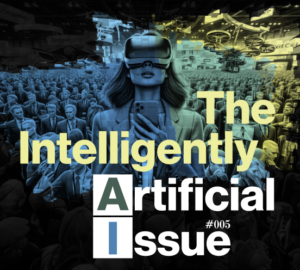Augmented
Intelligence:
from
UX to HX
Editor’s note: ON_Discourse co-founder Dan Gardner argues that human behavior is the ultimate prompt. This article explores what this means for user interface design.
Augmented Intelligence (AI) is becoming an everyday reality, fundamentally transforming how we interact with our world. Its primary driver is human behavior, the main “prompt” for AI development and application.
This shift challenges us to reconsider the role of AI in our lives, focusing on how it shapes and responds to human actions and decisions. I believe this evolution will be marked by a transition from User Experience (UX) to Human Experience (HX), wherein technological innovation emphasizes, rather than obscures, humanity’s essence.
This is a critical moment. We are at the forefront of a design renaissance, wherein our focus is shifting from mere interfaces to meaningful interactions, from digital screens to the human psyche. Transitioning from UX to HX signals a shift from interface-driven design to a more empathetic, behavior-centric approach.
We are at the forefront of a design renaissance, wherein our focus is shifting from mere interfaces to meaningful interactions, from digital screens to the human psyche.
In this new age, technology will become more than a tool. We won’t just be using AI algorithms and automation, we will be building a symbiotic relationship that marries AI’s analytical strengths with human intuition and insights.
While such a synergy can accelerate and amplify our abilities, it also brings forth a critical challenge: ensuring that AI augments human creativity and intuition without overshadowing them. We must not overlook the ethical implications of an AI-driven HX. Personalization in AI, while beneficial, raises privacy concerns. We must grapple with these ethical challenges head-on, ensuring that AI’s incursion into our lives respects our privacy and adheres to ethical standards.
One of the assumptions in our AI-driven journey is the belief that AI can fully understand and replicate the depth of human emotions and behaviors. Here lies a potential pitfall. We must strike a balance between leveraging AI’s capabilities and preserving human intuition and ethics in design.
For HX to work, I envision AI transcending traditional data analysis to offer a nuanced understanding of human emotions and behaviors. Imagine a customer service chatbot that can detect frustration in a conversation and respond with empathy, or e-commerce AI that suggests products based on emotional cues.

This article is part of The Intelligently Artificial Issue, which combines two big stories in consumer tech: AI and CES.
Read more from the issue:
USER EXPERIENCE
Augmented Intelligence: from UX to HX
Will prompting replace browsing?
The car is the gateway drug to a voice-first acceleration
The prompt interface needs a redesign
RE-ORG
AI will brainstorm your next reorg
Expect fewer managers and direct-reports
AI is too immature for your business
AI is not a new revolution
BRAND
Should we ignore the hardware?
Can AI help consumers love your brand?
Your brand doesn't have enough data for AI
Can LLMs be optimized like search results?
Good brands will integrate more friction into their C X
In health care, AI could evolve to support doctors by providing data-driven insights while preserving the irreplaceable human element in diagnosis and patient care. In education, AI could adapt to students' emotional states, offering personalized encouragement and learning paths.
These scenarios underscore the shift towards ethical AI design, where algorithms must be crafted with diverse datasets and regularly audited to prevent biases, ensuring fairness and inclusivity.
The AI era must also be characterized by transparency, with companies openly disclosing how their AI technology uses consumer data, thereby fostering trust. AI in smart homes, for example, should recognize and respect individuals' privacy preferences, ensuring that family boundaries are maintained.
As human behavior becomes the new prompt, it will become clear that the role of HX is not just to understand, but to respect and enhance human actions and emotions. The future will not be determined just by the sophistication of experiences that AI can create, but by how these experiences honor and elevate our humanity.

